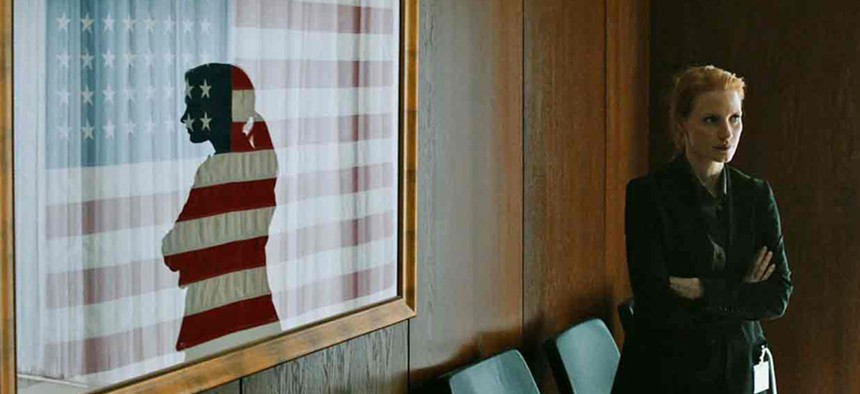
Sony Pictures
Report: 'Zero Dark Thirty' Creators Gave CIA Agents Jewelry, Liquor, Meals
Government documents uncovered by Vice News show that Mark Boal and Kathryn Bigelow wined and dined spies for info.
To create their Oscar-nominated film about the killing of Osama Bin Laden, theZero Dark Thirty writer Mark Boal and the director Kathryn Bigelow made friends in the CIA. During the process of interviewing clandestine agents about the decade-long hunt for the architect of 9/11, they reportedly paid for meals, jewelry, and expensive liquor. Boal attended a secret ceremony honoring the folks involved in the Bin Laden operation; Bigelow offered the agent who inspired the creation of Jessica Chastain’s character, someone with whom she’d had a few “social contacts,” a private screening at an exclusive club.
Jason Leopold and Ky Henderson at Vice News have revealed these and other details about the relationship between the ZD30 team and America’s spy agency based off documents obtained through a Freedom of Information Act lawsuit. Their article helps give shape to the widely known and already-controversial fact that the film, which helped popularize the Obama administration’s somewhat contested narrative about Bin Laden’s demise, was made with government input.
According to the story, Boal and Bigelow offered their subjects items ranging from hotel lunches to a ticket for a Prada runway show to a bottle of tequila priced online at $169.99. Some of these gifts were accepted by officers, some weren’t, and others were later paid for by their recipients. An inspector general probe determined that the filmmakers may have violated criminal law regarding bribing federal officials (neither the Justice Department nor the CIA chose to act on those findings), but it also found no evidence that the agents who’d been interviewed gave up classified information (though a speech Boal attended given by CIA chief Leon Panetta may have inadvertently done so).
As far as what specific information D.C. fed to Hollywood storytellers, the most concrete revelation is about the CIA’s vetting of the Zero Dark Thirty screenplay:
The official said he and another person whose name is redacted reviewed the script for “egregious errors like having dogs in the interrogation scenes.” The officer said that he told Boal this was inaccurate because “CIA would never have dogs in an interrogation room.” Boal was also told that a scene that showed “Agency officers partying and shooting guns” was inaccurate because “Agency officers would not do that.” Other concerns were raised about detainee debriefing scenes that depicted captives being “punched and kicked.”
Will any of this affect the film’s legacy? When it came out, some critics, including Senator Dianne Feinstein, accused it of dangerously endorsing the CIA’s use of “enhanced interrogation techniques.” Others, like The Atlantic’s Mark Bowden, saw that interpretation as a misreading of the movie’s attempts to depict the government’s missteps on the road to Bin Laden. In any case, it’s a good idea to keep in mind that the movie is meant to be a work of art, not journalism, and that its story was shaped by its subjects. In a 2012 Atlantic article titled “Don’t TrustZero Dark Thirty,” Peter Maass wrote that the movie “represents a new genre of embedded filmmaking that is the problematic offspring of the worrisome endeavor known as embedded journalism.” He continued,
An already problematic practice—giving special access to vetted journalists—is now deployed for the larger goal of creating cinematic myths that are favorable to the sponsoring entity (in the case of Zero Dark Thirty, the CIA). If the access that Boal and Bigelow received was in addition to access that nonfiction writers and documentarians received, I would be a bit less troubled, because at least the quotes in history’s first draft would be reliable, and that means a lot. But as it stands, we’re getting the myth of history before getting the actual history.
The Vice revelations don’t shed much light on how that myth differed from the actual history. But they do show that while it’s certainly possible the CIA manipulated the filmmakers, the filmmakers may have also tried to manipulate the CIA.






